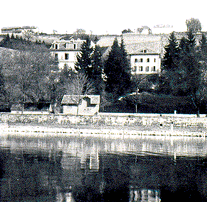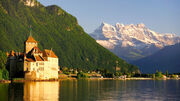Situated at the foot of the Swiss Alps on the banks of Lake Geneva, Geneva was home to around 30,000 people at the time Shelley began her novel. Torrential rains plagued the place in the summer of 1816, as Mount Tambora in Indonesia erupted and caused the widespread rains and storms. These weather conditions are said to be the impetus of Shelley’s horrific Frankenstein: confined inside for long periods of time, Shelley and her companion Lord Byron purportedly challenged each other to write a horror story reflective of their current conditions. Thus, Frankenstein was born and initially published (anonymously) in 1818.

Mary Shelley's house on the banks of Lake Geneva, during their stay in summer 1816 "Geneva, Switzerland"
“I am by birth a Genovese,” said Victor Frankenstein, “and my family is one of the most distinguished of that republic” (17). In her novel, Shelley’s protagonist, Victor Frankenstein, tells the narrator, Robert Walton, of his birth and early childhood in Geneva, as well as his subsequent departure from his home that may have been his downfall. While little of the novel transpires in Geneva itself, the birthplace of Victor serves as an important foundation in his later scientific progress. Shelley frequently invokes natural and serene imagery that is so at odds with Victor’s unnatural creation that subsequently plagues the novel. Thus, such a natural location highlights Shelley’s own attachment to and time spent in Geneva herself through its influence on Victor Frankenstein.
Natural Setting

Geneva, Switzerland Situated at the foot of the Swiss Alps on the banks of Lake Geneva
The role of Geneva as the impetus in
his enlightenment draws on the nature of the setting. While Shelley pronounces the extreme serenity and profound nature of the Genovese setting, it highlights the subsequent absence in the later settings associated with the violence and abomination of the creature. The rolling hills and placid lake emphasize the utter lack of such natural wonders in the atrocities of Victor’s lab made manifest in the assemblage of dead parts into something living – something that can hardly be termed “natural,” especially in comparison with his childhood home.
This calm, natural landscape also juxtaposes the chaotic nature of the writing of the novel, the turbulent rains and storms taking place while Shelley wrote Frankenstein in the same setting. While the landscape of Geneva remains calm and peaceful, the inner turmoil – and outer violence committed by the creature in the midst of such tranquility of Geneva – contrast to highlight the unnaturalness of the creature and Victor’s despair. This ultimately suggests the peace (especially of mind) that Victor potentially could have retained in Geneva had he never left and created such an unnatural atrocity in the creature.
“These green areas, in fact, contribute greatly to the quality of life of its inhabitants.” (Ville de Genève)
Furthermore, the peaceful setting is also indicative of the Genovese ownership as the “City of Peace.” Such an invocation recalls the peace that Victor felt previous to the enlightenment he developed later on. Thus, once he leaves the peaceful Geneva and experiences such inner turmoil in creating something so violent, he resolves to return to Geneva in an attempt to return to the peace. However, he is unable to do so as his creature has tainted the only peaceful place he has left – through the murder of his brother, William. Today, Geneva is home to the United Nations Office and the International Red Cross Committee – both notably peaceful organizations at odds with the unnatural scene in Shelley’s novel (Welcome to Geneva). The overabundance of the natural, peaceful setting draws attention to the aberration produced by Frankenstein.
Enlightenment & Means
It is important to note the removal of Geneva in the story of Frankenstein. It is at the Frankenstein family home in Geneva that Victor discoveries his interested in the “natural sciences,” yet he practices these experiments elsewhere (at Ingolstadt). Although his initial removal suggests that his profound discoveries are too progressive for the peaceful town of Geneva, it is Victor’s return to Geneva – and to the changes that have occurred since his departure – that is notably influential in the significance of setting. While Victor left Geneva to develop his enlightenment in the studies of natural sciences as made famous by Paracelsus and Agrippa, it is the same enlightenment that allows (or rather, forces) him to see past the façade of peaceful tranquility once returning to Geneva. That is to say, before leaving, he viewed the place as the mundane, tranquil landscape that he was confined to; yet after making such an unnatural creature, he is unable to un-know the enlightenment he has discovered and thus that taints everything he thought of as good and natural. Shelley shows this change in thought through the horrific deaths that transpire in Geneva, but also through Victor’s constant unsettled conscious while in the Frankenstein home.
"A few centuries ago, Europe’s most adventurous bohemians flocked to Lake Geneva on the Swiss-French border to savor its inspiring mountain scenery and liberal political climate...” (Perrottet)
Geneva is also known as the home of Rousseau, a radical philosopher and a known idol of the radical Mary Shelley herself. Thus, Shelley’s mention of Victor’s interest in Agrippa and Paracelsus is paralleled with the radical ideas of Rousseau, those ideas being the draw that initially attracted the “adventurous bohemians” Mary and Percy Shelley and their companion, Byron, to the location. In homage to these radical thinkers, Shelley established Geneva as the birthplace of Victor’s enlightenment, as well as the continuation of his mental unsettlement after his scientific creation.
Additionally, the Frankenstein family is notably well off and well situated in the town of Geneva. Early on in the novel, Shelley mentions that the father Frankenstein was able to retire from his court duties in order to stay in the home; this denotes a noticeable wealth in the family that largely aids the pursuit of knowledge and ultimately enlightenment. It is perhaps the Frankenstein’s situation in Geneva that affords them the luxuries of further knowledge, yet such comfort and placidity that spurs Victor to pursue his experiments in the unnatural. Furthermore, while Alphonse Frankenstein presumably supports Victor in his endeavors away from home, Shelley may be suggesting that the lack of means (and thus, comfort) in Ingolstadt is a significant factor in the mental turmoil plaguing Victor after his creation. Or, without the illusions of grandeur and money in Geneva at the Frankenstein home, the atrocities of humanity were made real to him and made manifest in his unnatural creation.
Humanity & Death
Victor’s close relationship with his family and friends at Geneva was somewhat impeded by his long-term experiments at Ingolstadt, yet ultimately serves as the representation of his humanity. That is to say, because Victor conducted his experiments and aberrations against the typical “human” away from his home in Geneva, his connections with his family – those natural humans with whom he has close, positive ties – become the ties to his own humanity. At Geneva, he returns to be surrounded by humans of natural birth and nature, yet feels isolated from this humanity and freeness of nature because of the unnatural acts he has just committed. Furthermore, his removal from Geneva is not only literal, as he has been absent from the Frankenstein home for nearly 6 years, but also mental: his removal has severed his ties to humanity, as his recent interactions away from even Ingolstadt have been only with the inanimate corpse pieces in his laboratory.
While Geneva is the birthplace of Victor and the birthplace of his intellectual identity, where he discovered his love for academia, Geneva soon becomes a place of death. It is in Geneva that the mother Frankenstein dies, William Frankenstein is murdered, Justine Moritz is hanged, Elizabeth Lavenza Frankenstein is murdered, and Alphonse Frankenstein dies. Beginning with his mother’s death, which is curiously aligned with his departure for his experiments at Ingolstadt, the Geneva household and the city itself becomes plagued with death once Victor creates the monster. This symbolizes the death of Victor’s own humanity, represented through his family, which up to this point has been largely important to him.
Furthermore, it is important that while Victor’s creativity of life and academic interests may have died in Geneva alongside his loved ones, Victor himself does not die there. It is the noticeable distance from Geneva that emphasizes Shelley’s portrayal of Victor: it is because Victor does not die in Geneva, but rather on a ship in the arms of a stranger seeking knowledge just as he did, that symbolizes his complete removal from the natural setting of his home in Geneva. His humanity and enlightenment have died there, yet his physical body has subsisted until his death on the ship with Robert Walton.
References/Suggestions for Further Reading
"Geneva, Switzerland." Geneva Switzerland Travel Information. Web. 20 Feb. 2016.
"Summer of Love: The Romantics at Lake Geneva." Biblion: The Boundless Library. Web. 21 Feb. 2016.
Perrottet, Tony. "Lake Geneva as Shelley and Byron Knew It." The New York Times. The New York Times, 2011. Web. 21 Feb. 2016.
"Welcome to Geneva." Ville De Genève. Web. 20 Feb. 2016.
"Geneva, Switzerland." Geneva, Switzerland. Web. 21 Feb. 2016.
